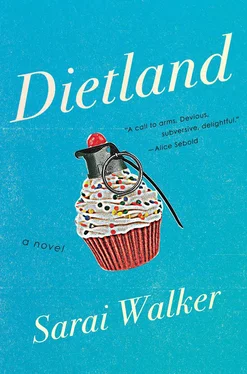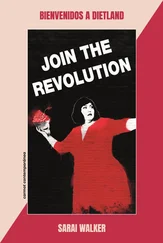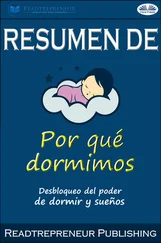• • •
IN THE AFTERMATH of my encounter with the girl, I needed to prepare for a visit to Kitty. The visit only came once a month, like my period, and I greeted it with the same level of enthusiasm.
On the subway ride from Brooklyn to Manhattan, I retraced the word DIETLAND on my palm, using my fingertip. What did it mean? I had thought the girl was ridiculing me, but she didn’t seem cruel. What I knew for certain was that she was weird. If she bothered me again, I would have to go to the police, but I feared that in a city full of murderers and terrorists they weren’t likely to care that a girl in colorful tights was trailing me.
I exited the subway station in Times Square, stopping at the top of the stairs to catch my breath in the heat. With my employee badge I entered the Austen Tower, a glistening silver tree trunk. Austen Media was an empire, publishing magazines and books, running a range of websites, and broadcasting two lifestyle channels. If someone had flown a 747 into the Austen Tower and it crumbled to the ground, American women would have had far fewer entertainment options.
Before my job with Kitty I had worked for a small, not-very-prestigious publishing imprint that was owned by Austen but located in a drab building twenty blocks south. We produced novels about young career women looking for love. The covers of the novels were in springtime shades, like the walls of a baby’s nursery. I didn’t have anything to do with the content, but worked in production, tracking manuscripts, liaising with editors, helping to usher the books into the world. After college, I had wanted to write essays and feature stories for magazines, but I couldn’t find a job doing that, so I settled at the publisher. I loved words and the publisher offered me a chance to work with words all day long, even if they were someone else’s. It was a place to start. A foot wedged in the door of the word industry.
My coworkers at the publisher were middle-aged women who wore tennis shoes to work with their skirts and nylons. I soon became comfortable in their world of Tupperware lunches and trips to the discount shoe mart after work, so I made no effort to move on and find the writing job I had dreamed about. One day, after I’d spent more than four years at the publisher, my boss called me into her office to tell me the bad news. We were going out of business.
“I’m sorry I couldn’t say anything sooner, but you probably heard the rumors.” A vase of hydrangeas sat on her desk, blue pompoms in brown water, dropping their shriveled petals onto her Filofax.
“Well,” I said. The rumors hadn’t reached me.
“It’s not just us. They’re cleaning house. It’s the whole building.” The whole building was a mail-order book club and a few small magazines, one about cats, another about doll collecting. We had gone unnoticed for years, the dregs of the Austen empire, hidden in an annex on Twenty-Fourth Street. At long last, Stanley Austen had looked down from his perch in the silver tower and noticed us in a tiny corner of his kingdom. Then came banishment.
After the publisher closed, I was unemployed except for random shifts at Carmen’s café, but eventually a woman named Helen Rosenblatt from Austen’s Human Resources department called to schedule a meeting with me. I went to the Austen Tower as directed, and rode the elevator to the twenty-seventh floor. Helen was a middle-aged woman with a tumbleweed hairdo and a gummy smile. I followed her to her office, noticing that her linen skirt was wedged between her buttocks.
Helen said that my boss from the publisher had told her all about me. “We’re old friends,” Helen explained, and I wondered what had been said. Helen wanted to talk about Daisy Chain, the magazine for teens. I had read Daisy Chain when I was in high school. Even my mother and her friends had read it when they were that age. It had been published since the 1950s and was such a part of Americana that the first issue was displayed in the Smithsonian, alongside Seventeen and Mademoiselle. I guessed that the old issues of Daisy Chain on display at the museum weren’t like the current issue on Helen’s desk, with a cover that read POPPING YOUR CHERRY—IT’S NOT THAT SCARY!
Helen told me that Kitty Montgomery was the new editor of Daisy Chain. Austen’s other teen magazines had ceased publication, so Kitty was carrying the flag for the teen demographic. “She’s a huge hit,” Helen said. “Mr. Austen’s so pleased, he’s had her up to his place on the Vineyard twice.” Helen explained that in her monthly column, Kitty was fond of sharing photos and tragic stories from her teenage years, when she was a gangly, pebble-chested misfit from the suburbs of New Jersey. As Helen took a phone call, I perused several of Kitty’s columns and read about her being beat up by other girls and shoved into lockers by boys. Her mother compounded her misery by never letting her wear makeup or use a razor. In contrast, at the end of each column there was a photo of Kitty as a glamorous grownup, one who had miraculously shed her hideous adolescent skin and emerged, victorious, like a grand white snake. In her current photos she was perched on the corner of her desk in the Austen Tower; visible behind her were the plains of New Jersey, the land of her former tormentors, so small and insignificant.
“Given Kitty’s popularity, she’s swamped with correspondence from readers,” Helen explained when she finished her call. “They’re inspired by Kitty and how she transformed herself. They desperately want her advice and contact her through the Dear Kitty section of the website. It’s like a flood.” I waited for Helen to explain what any of this had to do with me. I knew there was the prospect of a job, but I assumed it was something tucked away in the subscription department.
“The legal department would prefer that we send out cookie-cutter form responses to the readers, but Kitty won’t hear of it. We’ve decided to indulge her and hire someone to take on the responsibility of responding to her girls, as she calls them, by offering big-sisterly advice and encouragement, that sort of thing. This is private correspondence, so it doesn’t appear in the magazine.” Helen looked at me and paused. “I think you might be perfect for this. I’ve sent others up there and none of them have worked out, but you,” Helen said, putting her glasses on and eyeing me, “you’re different.”
I knew what my former boss had said about me.
“You want someone to respond to these readers while pretending to be Kitty?”
“I wouldn’t think of it as pretending. You’d be a team.” Helen folded her arms across her chest, which was not two separate breasts but just an enormous shelf. “You’re older than the other girls we’ve considered for the job, and you’re different from them in many ways. Most of them are—Well, you know the type. I hear that you’re smart, but I don’t mind that. You’d write in Kitty’s voice. You wouldn’t have to believe what you’d write; it only matters that Kitty would believe it and write it if she had time. I think you’d have insight into the problems our girls have—that’s what’s important.”
I should have been grateful for the possibility of a job, but I felt defensive and was trying to hide it. “What makes you think I’d have such insight? You don’t even know me.”
“I’m guessing,” she said, and we both knew what she meant. I hated it when others alluded to my size, despite the obviousness of it. It was as if they were confirming that there was something wrong with me when I’d hoped they hadn’t noticed it.
I appreciated Helen’s offer, but the thought of working in the Austen Tower every day was unappealing. I imagined it was like a fifty-two-story high school, full of cliques and whispers. Helen must have begun working at Austen Media decades before she morphed into the large postmenopausal woman who sat before me.
Читать дальше












